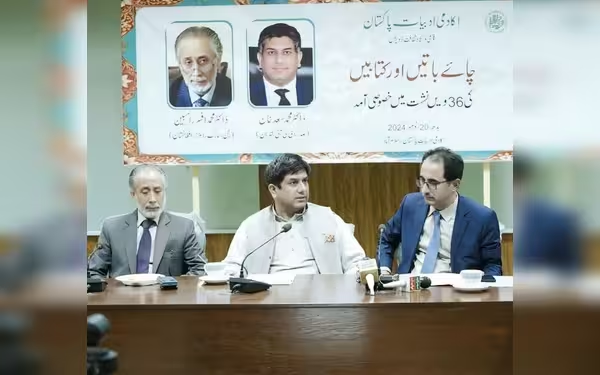Wednesday, January 8, 2025 09:27 PM
PAL Hosts Afghan and Iranian Writers for Literary Exchange
- PAL's event featured Afghan and Iranian literary figures.
- Dr. Khan presented Persian translations of Urdu poems.
- Literature fosters cross-cultural dialogue and understanding.
 Image Credits: pakobserver.net
Image Credits: pakobserver.netPAL hosted Afghan and Iranian writers, promoting cross-cultural dialogue through literature and poetry translations.
The Pakistan Academy of Letters (PAL) has long been a beacon of literary culture in the region, fostering connections among writers and poets from various backgrounds. Recently, it hosted the 36th session of its popular series titled “Chai, Baatain, aur Kitabain.” This event brought together distinguished literary figures from neighboring countries, specifically Afghanistan and Iran, to share their insights and works with a captivated audience.
Among the notable guests were Dr. Muhammad Afsar Rahbeen, a celebrated poet and writer from Afghanistan, and Dr. Saad Khan, an esteemed author and the President of the ECO Cultural Institute (ECI) based in Tehran. Their presence at the event highlighted the importance of cross-cultural dialogue in literature, showcasing how words can bridge gaps between nations.
During the session, Dr. Khan presented Persian translations of two significant Urdu poems, “Himala” and “Jawab-i-Shikoh.” These translations were not only well-received but also sparked engaging discussions among attendees about the beauty and depth of poetry across different languages. The audience was particularly impressed by how the essence of the original works was preserved in translation, allowing for a richer understanding of the themes and emotions conveyed.
The event served as a reminder of the power of literature to unite people, transcending borders and cultural differences. It is through such gatherings that writers can share their experiences, learn from one another, and inspire future generations. The exchange of ideas and artistic expressions fosters a sense of community and understanding, which is essential in today’s world.
The literary meeting organized by the Pakistan Academy of Letters not only celebrated the rich literary traditions of Afghanistan and Iran but also reinforced the idea that literature is a universal language. As we continue to navigate a complex global landscape, events like these remind us of the importance of dialogue and collaboration in the arts. They encourage us to appreciate the diverse voices that contribute to our shared human experience, ultimately enriching our understanding of one another.













